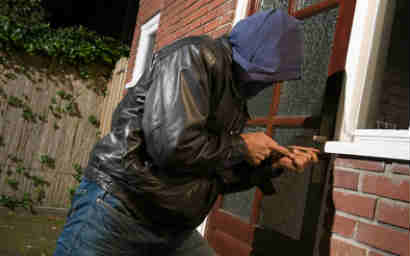A Home Security Monitoring System Guarding Your Home.
There is little doubt that homes protected by a 24/7 home security
monitoring system are far less prone to be successfully burgled.
In
fact, many home insurance companies volunteer a discounted rate for
homes defended by monitored home security.
If an intruder triggers a monitored security system not only does an
alarm or siren sound to alert neighbors and to attempt to scare off the
burglar, but also a signal is sent to a central monitoring station.
The monitoring station will then call your home in order to
verify if it is an actual emergency being reported or a false alarm. The
representative will request your pass code.
If an incorrect pass code is given, or if the call is unanswered, the police are immediately alerted.
With some systems, if a wrong code is given to the monitoring
station they will assume that you are answering under duress, (as in a Home Invasion
situation,) and the police are advised accordingly.
With other home monitoring systems you will be given a special code to use in
such circumstances.
Why aren’t the police notified immediately when a
home security monitoring system sends a signal to the central
monitoring station?
Because of high occurrences of False Alarms.
To send the police to an address where there is no real emergency
diverts them from attending incidents where they are really needed.


A false alarm can occur through a homeowner forgetting to disable
the monitoring system on their return home, or through a pet triggering
the system.
In order to greatly reduce occurrences of calling out the
police unnecessarily, all home monitoring systems attempt to rule out
the possibility of a false alarm before alerting the authorities.
Should you suffer a complete loss of electrical supply then a
battery back-up steps in to ensure that your home security monitoring
system continues to protect your home.
But what happens if your phone system goes down or an
intruder manages to cut your phone lines?
Typically, a monitored
security system will have a cellular or radio back-up that transmits a
signal to the central monitoring station if your phone lines are cut. The back up then transmits the alarm signals.
VoIP, voice over
Internet, users will need a cellular back-up in the event of the
Internet connection going down.
Central monitoring and your home security system.
The central monitoring station that your home security
monitoring system connects to, needs to be as efficient as the system
itself.
Obviously the station will need to be operating 24/7/365 in all
circumstances.
Some security providers run their own stations and others use the
services of third party monitoring stations. The important point is
whether the station can continue to monitor your system in an emergency.
A central monitoring station should have effective stand-by power
generation in the event they lose their electrical supply.
Many
monitoring providers run duplicate centers, many miles apart, so that
should a disaster befall one center the system is immediately switched
to the other.
A good monitoring station will also have duplicate hardware and
spare trained staff to ensure that your home security system remains
monitored. The Underwriters Laboratories (UL) certify many central
monitoring stations.
For more information about whether a home security monitoring system will provide the protection that you need see this page – A Monitored Home Security System.
Surveillance for Security
>
Wireless Home Security
>
Home Security Monitoring System.
A Safe Room. A secure refuge in your home.
Most homes have a room or a large closet that can be converted into a safe room (a.k.a. panic room.) Many homeowners are seeing the advantage of a secure safe room within their home.
Family Security.
Don’t leave your family’s security to chance; devise a family security plan. Sit down with your family and discuss how you all would expect each other to react should a home security issue arise.